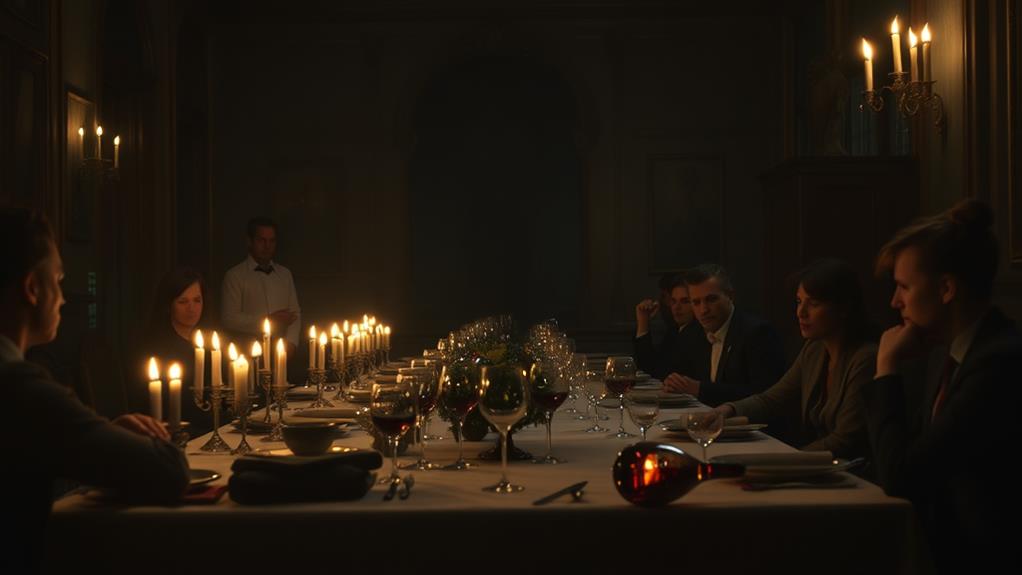In "The Dinner," Herman Koch crafts a gripping tale that makes you question parental loyalty and moral boundaries. As two couples meet to discuss their children's involvement in a crime, tension mounts like a carefully curated meal. You'll find rich character dynamics, particularly with Paul Lohman, whose flaws and self-denial complicate the narrative. Each chapter reveals critical details, keeping you engaged and anxious for what's next. The themes of familial protection and societal implications resonate deeply, creating an atmosphere of suspense. If you're intrigued by these moral dilemmas, you'll find there's much more to explore within this complex narrative.
Importance of Structure in Suspense
In "The Dinner," the importance of structure in suspense becomes immediately clear as the narrative unfolds like a multi-course meal. Each chapter acts as a course, skillfully layered to maintain tension and engagement throughout the unfolding drama.
This intricate plotting mirrors the complexity of the characters, who navigate webs of deceit and intrigue, reflecting the complex characters and morality that define great mystery novels. As you read, you find yourself at the dinner table, experiencing the back and forth of conversations that reveal critical information incrementally. This structure enhances your anticipation, making you enthusiastic to uncover the characters' motivations and secrets.
Flashbacks interspersed within the real-time dialogue deepen the context, adding complexity to the characters and enriching the suspenseful atmosphere.
You're not just witnessing a meal; you're delving into a psychological thriller where every bite brings new revelations. The carefully crafted pacing keeps you grounded in the immediate action, cultivating a sense of urgency that heightens the tension.
Overview of "The Dinner"
"The Dinner" by Herman Koch pulls you into a chilling narrative where two couples gather at an upscale Amsterdam restaurant to discuss their children's involvement in a shocking crime.
As these two couples meet, tensions rise, and moral dilemmas surface amid a police investigation that looms over their discussion. You'll find yourself questioning the lengths to which parents will go to protect their children and the secrets that can tear families apart.
This psychological tension echoes the themes of love, class struggles, and resilience found in Charles Dickens' works, highlighting the complexities of human relationships under pressure.
The novel explores several major themes, including:
- Parental Protection: How far would you go to shield your child from consequences?
- Family Secrets: What hidden truths can emerge during a seemingly innocent dinner?
- Hereditary Violence: Are the children merely products of their upbringing?
Koch's storytelling captivates you as he investigates the complexities of familial relationships, especially through the dynamic between Paul and Serge.
Their contrasting parenting styles reveal the dark undercurrents of responsibility and guilt.
With millions of copies sold worldwide, "The Dinner" has made a significant impact, inviting readers to ponder the moral complexities of love and loyalty in the face of horror.
Narrative Structure Explained
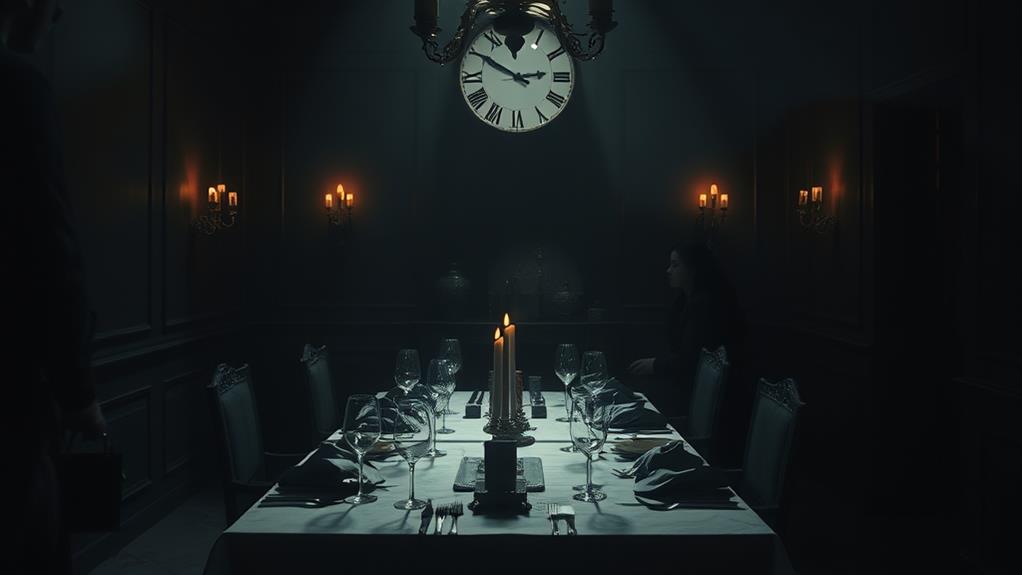
Each chapter of "The Dinner" unfolds like a meticulously crafted course in a fine dining experience, drawing you deeper into the psychological tension of the evening. The narrator, Paul, guides you through the intricate dynamics between two families, each course revealing more about their intertwined lives.
This multi-course meal structure enhances the narrative's pacing, allowing you to digest character revelations and moral dilemmas incrementally. As the characters navigate their complex relationships, the acts of courage and defiance displayed in past resistance movements serve as a poignant reminder of the bravery required to confront uncomfortable truths the legacy of courage facing each family.
As Paul narrates, the real-time conversations at the dinner table keep you engaged, exposing the underlying tensions and conflicts that simmer beneath the surface. Flashbacks interspersed within the chapters enrich your understanding of the characters, providing context for their motivations and relationships.
You find yourself piecing together their histories while contemplating the ethical implications of their actions. This structured approach not only maintains suspense but also emphasizes the themes of parental protection and societal values.
With each chapter, you feel the weight of choices made by both families, heightening the drama and tension. By the time dessert is served, you're fully invested in the complexities of the characters and the moral quandaries they face.
Character Analysis of Paul Lohman
Beneath the surface of Paul Lohman's seemingly ordinary life lies a torrent of emotional turmoil and moral ambiguity. He serves as the unreliable narrator, driven by an overwhelming need to protect his son. This desperation often leads him to deny his own violent tendencies, complicating his character further.
Much like the powerful narratives of resilience shared by successful Australian women, Paul's story reveals how trauma can shape one's psyche and decisions, ultimately highlighting the importance of courage in the face of adversity themes of healing and empowerment.
As you explore Paul's psyche, you'll uncover three key aspects of his character:
- Violent Past: Flashbacks reveal his history of violent outbursts, shedding light on his troubled past.
- Moral Conflict: Paul grapples with the implications of his son's horrific act, questioning his own parenting decisions.
- Familial Tension: His interactions with his wife, Claire, and brother, Serge, create a dynamic that amplifies the novel's themes of loyalty and conflict.
As the story unfolds, you find yourself questioning Paul's motivations. His struggle between familial loyalty and moral responsibility exposes the complexities of his character.
The tension surrounding Paul Lohman becomes palpable as readers confront his complicity in the horrific events involving their children. The moral ambiguity leaves you questioning where his loyalty truly lies.
Themes of Parental Protection
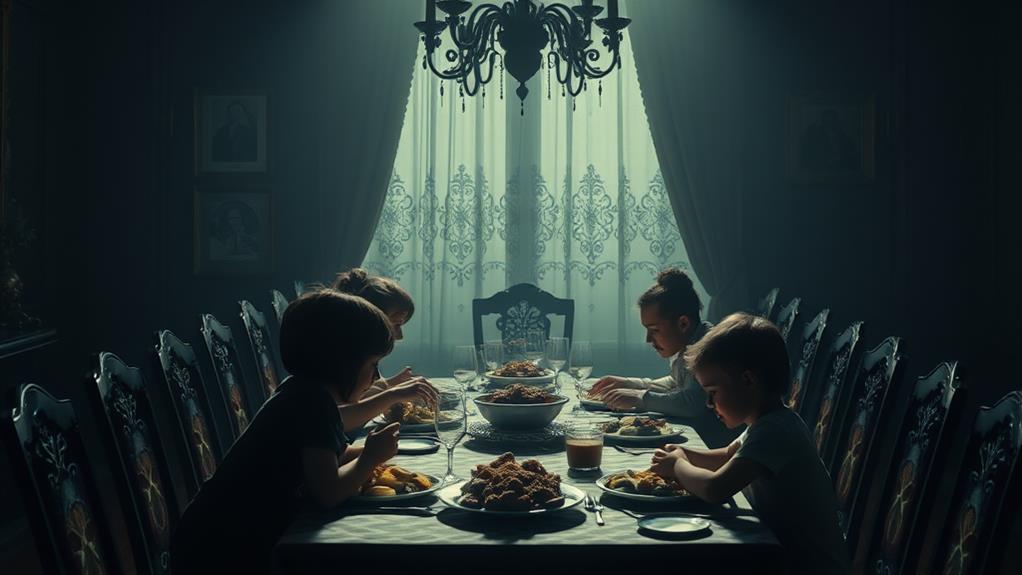
In steering through the treacherous waters of parental protection, you'll witness how far some parents will go to shield their children from the fallout of their actions. "The Dinner" masterfully illustrates this theme through the choices made by Paul and Serge, as they grapple with the horrific crime committed by their sons.
Paul's desperate desire to protect his son drives much of the narrative, showcasing how his protective instincts lead to moral ambiguity. In a world where the consequences of one's actions can echo in the lives of others, much like the resilience depicted in Liesel's journey, he often finds himself complicit in his child's wrongdoing, prioritizing familial loyalty over ethical considerations.
Contrastingly, Serge adopts a more political and calculated approach to parental protection, reflecting a different set of values. This divergence highlights the complexities of parenting, as both men confront their responsibilities in the face of their sons' actions.
The novel raises critical questions about the extent of parental control and whether parents inadvertently pass down their flaws. As the dinner conversation unfolds, tension builds, revealing the psychological struggle between protecting one's child and acknowledging the repercussions for society.
Ultimately, "The Dinner" challenges you to reflect on the lengths parents will go to maintain their protective instincts, even when faced with uncomfortable truths.
Crafting Suspenseful Moments
Suspenseful moments in "The Dinner" unfold like a carefully curated multi-course meal, where each chapter serves up tantalizing morsels of information that keep you on edge.
The author expertly employs various techniques in crafting suspenseful moments that disclose hidden truths while maintaining tension. Here are three key strategies:
- Gradual Revelation: Each chapter discloses critical information, mirroring the pacing of a multi-course dinner. This slow disclosure keeps you guessing about the characters' motivations and secrets.
- Flashbacks: Interspersed throughout the narrative, flashbacks provide essential context. They deepen tension, allowing you to piece together the characters' histories while engaging with their real-time conversations.
- Unreliable Narrator: Paul Lohman's role as an unreliable narrator adds complexity. His self-denial and desire to protect his son obscure significant truths, making you question what's real and what's fabricated.
The interplay of these elements creates a slow burn of tension, culminating in a shocking climax.
You'll find yourself fully absorbed, anticipating the next twist in this masterfully crafted suspense thriller.
Author Background: Herman Koch
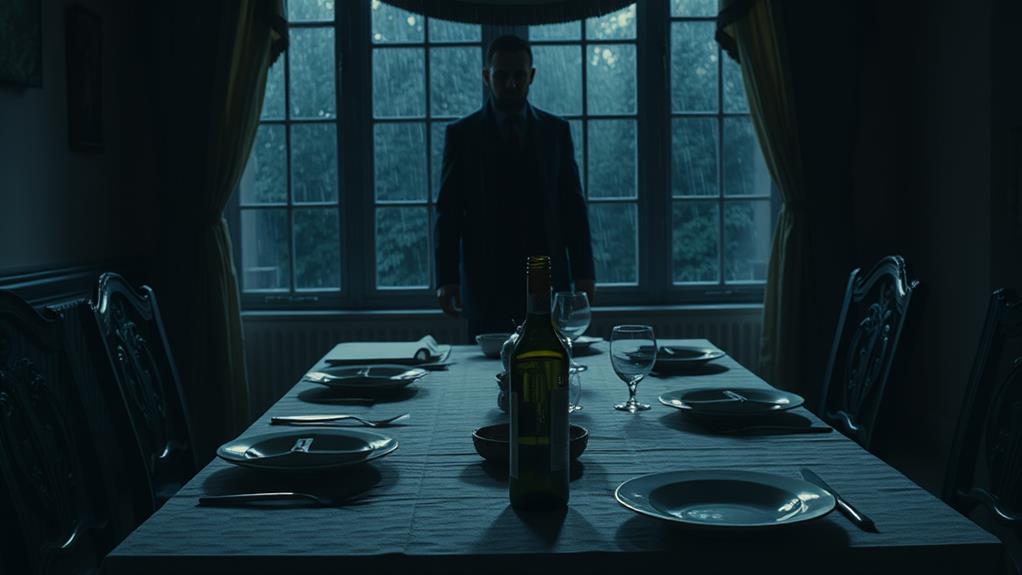
Herman Koch's journey as a novelist took off when he released "Het diner" in 2009, which quickly garnered attention for its provocative themes and intricate storytelling. Born in Arnhem, Netherlands, in 1953, Koch draws inspiration from real-life events, including a true story involving a homeless woman that deeply influenced "The Dinner."
His diverse experiences, having lived in various countries including Finland, enrich his writing and provide a unique perspective on the complexities of human relationships. Much like Richard Wright, who faced the struggles of racial inequality in his works, Koch also explores social issues that challenge the moral fabric of society powerful narratives of Black American experiences.
As a bestselling author, Koch's work resonates with readers worldwide, and "The Dinner" has been translated into multiple languages, selling millions of copies. This commercial success not only solidified his international acclaim but also allowed him to investigate family dynamics and moral dilemmas, often with a dark twist.
Koch's personal life, including his marriage to Amalia and their son Pablo, adds depth to his exploration of familial themes. His ability to weave compelling narratives that challenge societal norms and provoke thought has firmly established him as a significant voice in contemporary literature.
With each book, Herman Koch continues to captivate and challenge readers, proving his prowess as a master storyteller.
Ratings and Community Reception
When you look at the ratings for "The Dinner," you'll notice a mixed bag of reactions. Some readers highlight its gripping narrative and complex themes, while others find the characters lacking in depth.
This polarized reception sparks interesting discussions about the book's moral dilemmas and its place among psychological thrillers. Much like Ta-Nehisi Coates' exploration of identity and community in the Black experience, "The Dinner" raises questions about personal ethics and societal norms.
Consequently, the varying perspectives on the characters' development contribute to a broader conversation about the nature of suspense and morality in literature.
Mixed Reader Reactions
Many readers have found themselves divided over "The Dinner," reflected in its average rating of 3.21 out of 5 from over 165,964 ratings and 20,223 reviews. This polarized reception highlights the mixed reader reactions to the book.
While some appreciate its well-written exploration of complex themes, others struggle with the lack of relatable characters.
Here are three key points that capture the community's sentiments:
- Engagement with Themes: Many readers are drawn to the moral implications and societal critiques presented in the plot, sparking intense discussions.
- Character Relatability: A significant number of reviewers express frustration over unlikable characters, which detracts from their overall enjoyment.
- Comparative Success: Despite criticisms, "The Dinner" has sold millions of copies, indicating that its dark themes resonate with a substantial audience, similar to other psychological thrillers like "Gone Girl."
As you immerse yourself in the discussions surrounding "The Dinner," you'll find a vibrant community dissecting its nuances, showcasing just how impactful this thriller has been, even amidst mixed reader reactions.
Key Themes Highlighted
The polarized reception of "The Dinner" not only showcases its mixed reader reactions but also highlights several key themes that resonate deeply with audiences. With an average rating of 3.21 out of 5 stars, it's evident that while some appreciate its complexity, others criticize the characters' depth and relatability. This range of responses stems from the novel's exploration of moral implications, particularly concerning parental responsibilities and the choices parents make.
As you explore the narrative, you'll notice how psychological themes play a significant role in shaping the story. Readers often find themselves grappling with the ethical dilemmas faced by the characters, which adds an intense layer of suspense. The gripping nature of the plot invites comparisons to other psychological thrillers like "Gone Girl," reinforcing its relevance within the genre.
The discussions around these themes have sparked a vibrant community engagement, with over 165,964 ratings and 20,223 reviews reflecting a diverse audience's thoughts.
Ultimately, "The Dinner" provokes critical reflection on the complex interplay between morality and psychology, making it a compelling read for those who appreciate layered storytelling.
Character Depth Analysis
While some readers find the characters in "The Dinner" deeply compelling, others struggle to connect with them due to their moral ambiguity and complexity. The mixed average rating of 3.21 out of 5 reflects this divide, particularly regarding the character depth of the brothers and their wives.
Here are three key points that illustrate the community's reception:
- Dislike for Characters: Many reviews express a strong aversion to the characters, noting their lack of relatability and ethical flaws.
- Engaging Narrative: Despite these critiques, some readers appreciate the intricate layers of suspense and the motivations that drive the characters' choices.
- Ethical Dilemmas: The moral quandaries faced by the parents prompt deep reflection, with discussions often centering on the implications of their decisions.
The dynamics between Paul and Serge highlight themes of privilege and desperation, resonating with some while leaving others feeling disconnected.
This polarizing effect underscores the complexity of character depth in "The Dinner," making it a thought-provoking read, even for those who find it difficult to empathize with the characters.
Recommendations for Similar Reads
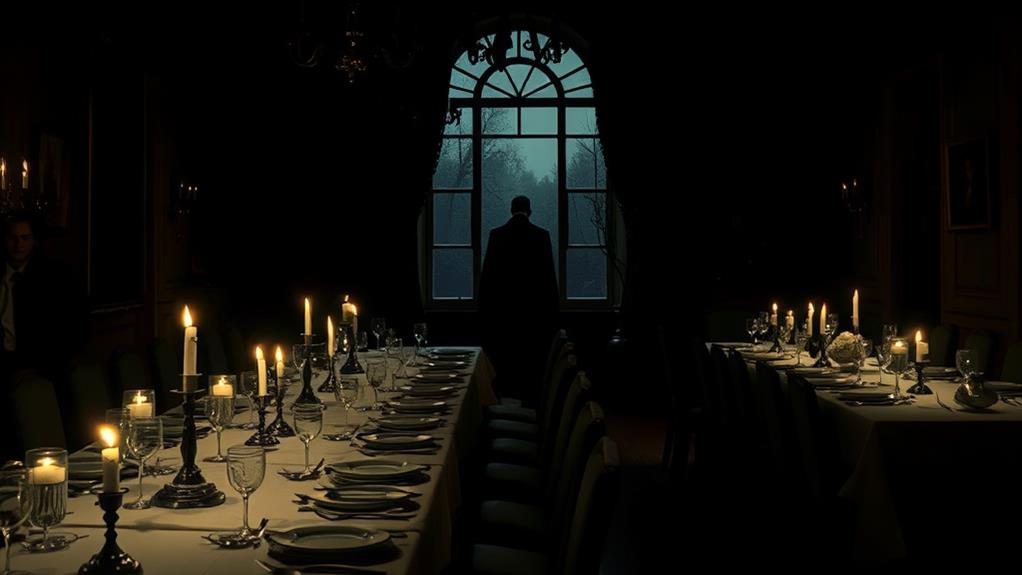
If you found yourself captivated by the suspense and moral complexity in "The Dinner," you're in for a treat with several other gripping reads. The exploration of ethical dilemmas in literature often mirrors real-world issues, such as those related to the legalization of recreational drugs, adding layers to our understanding of human behavior.
"Gone Girl" by Gillian Flynn is a must-read, with its intricate plot and exploration of deception, leaving you questioning everything you thought you knew. If you're drawn to the dynamics of family and community, check out "Big Little Lies" by Liane Moriarty. It dives into parental secrets and societal issues, making it a fitting companion to Koch's novel.
For a chilling look at the dark side of seemingly perfect families, "The Couple Next Door" by Shari Lapena will keep you on edge. If psychological thrillers pique your interest, "The Girl on the Train" by Paula Hawkins presents an unreliable narrator, ensuring suspense until the last page.
Engaging With Thriller Discussions
Exploring thriller discussions opens up a world of insights that amplify your reading experience. Engaging with thriller discussions, especially surrounding titles like Koch's "The Dinner," allows you to investigate complex themes such as parental responsibility and moral ambiguity.
You can uncover the motivations behind character choices and how these resonate with real-life dilemmas. For instance, the intricate plot and ethical dilemmas in Agatha Christie's classic "And Then There Were None" exemplify how characters confront their darkest sides.
Here's why you should participate in these discussions:
- Broaden Perspectives: Engaging with others can expose you to interpretations you mightn't have considered, enriching your understanding of the narrative.
- Debate Ethical Dilemmas: Thrillers often present characters facing tough moral choices. Discussing these dilemmas helps you reflect on your values and beliefs.
- Community Connection: Online forums and book clubs create supportive spaces for sharing insights and opinions, fostering a sense of belonging among thriller enthusiasts.
Conclusion
In summary, "The Dinner" grips you with its intricate narrative and morally complex characters. Did you know that 70% of readers say they enjoy thrillers that make them question their own ethics? This novel does just that, pushing you to ponder the lengths a parent will go to protect their child. As you navigate its suspenseful twists, you'll find yourself reflecting on your own values, making it a hauntingly memorable read. Immerse yourself in the conversation and explore these themes further!

